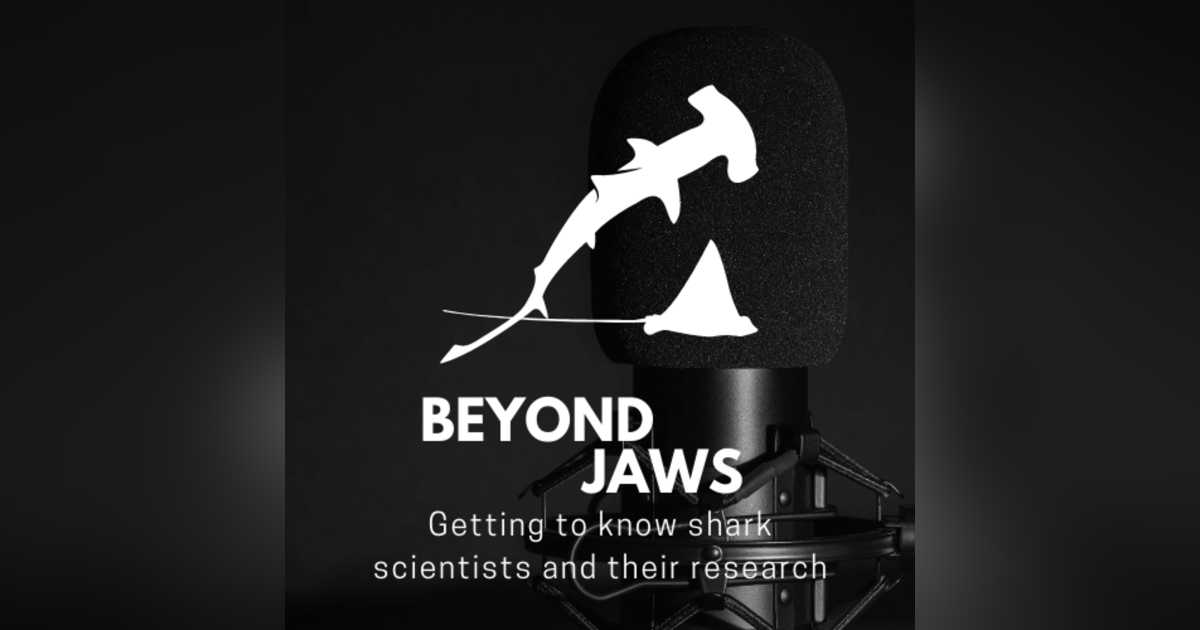The Multi-Faceted Role of a Global Communications Manager

On this episode of the Beyond Jaws podcast, hosts Andrew Lewin and Dr. David Ebert are joined by Jade Schultz, the global communications manager for Save Our Seas. They dive into the world of science communication, focusing on engaging audiences with...
On this episode of the Beyond Jaws podcast, hosts Andrew Lewin and Dr. David Ebert are joined by Jade Schultz, the global communications manager for Save Our Seas. They dive into the world of science communication, focusing on engaging audiences with sharks and ocean species. From the historical perception of sharks to the diverse fields within shark science, listeners will gain insight into the fascinating work of shark scientists.
Tune in to explore the efforts to demystify these incredible creatures and expand your knowledge Beyond Jaws.
Website: https://saveourseas.com/
Connect with us:
Website: https://bit.ly/37TMqeK
Instagram: https://bit.ly/3eorwXZ
Beyond Jaws is supported by Save Our Seas
Website: https://saveourseas.com/
Dave:
Website: https://www.lostsharkguy.com/
Instagram: https://bit.ly/3q1J9Q5
Andrew:
Website: https://www.speakupforblue.com/
Instagram: https://bit.ly/37g5WkG
Social media has significantly impacted the field of science communication, as discussed in the podcast episode featuring Jade Schultz, the global communications manager for Save Our Seas. She emphasized how social media has revolutionized the way organizations interact with their audience, democratizing science communication and enabling individuals to establish themselves by consistently sharing content.
Jade highlighted the vital role of social media in education and awareness, particularly in marine conservation. She noted that social media has provided a platform for researchers and organizations to share their work and stories with a broader audience, allowing for diverse voices to be heard and information to be disseminated in a more accessible and engaging manner.
Moreover, Jade delved into the challenges and opportunities of managing social media for a conservation organization like Save Our Seas. She stressed the importance of fact-checking, relevance, and engaging content to effectively convey the organization's message. Social media management involves not only posting photos and captions but also planning events, engaging with sponsors, sending out press releases, and coordinating various initiatives within the organization.
The podcast episode illustrated how social media has transformed science communication, expanding outreach, engagement, and impact in marine conservation. The evolution of social media has empowered organizations like Save Our Seas to reach a wider audience, educate the public, and inspire action towards ocean conservation.
The role of a communications manager in marine conservation organizations is multifaceted, extending beyond social media management. As discussed in the podcast, Jade Schultz highlighted the diverse tasks involved in her position, such as event planning, sponsorships, and press releases.
Additionally, the communications manager plays a crucial role in maintaining consistency in messaging and upholding high standards for the organization. Save Our Seas has set a high standard, and the communications manager ensures this standard is maintained across all communication channels.
Engaging with the audience through storytelling and sharing success stories is essential for inspiring behavior change and raising awareness about conservation issues. Jade Schultz emphasized the power of storytelling in science communication, bridging the gap between researchers and the public. By sharing engaging content like the Super Sharks campaign, Save Our Seas aims to make conservation messaging more accessible and inspiring.
Furthermore, Jade discussed the challenges researchers face in communicating their work and highlighted the opportunities presented by social media and digital platforms. By utilizing various communication channels, organizations can effectively convey conservation messages and reach a wider audience.
Overall, the episode underscored the importance of engaging with the audience through storytelling and sharing success stories to drive behavior change and raise awareness about conservation issues. By creating compelling narratives and involving the audience in the conservation journey, organizations can inspire action and foster a deeper connection with marine conservation efforts.











